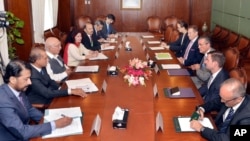Senior U.S. officials held “candid discussions" Friday with their counterparts in Pakistan on the recent drone attack that killed the Afghan Taliban’s chief in Pakistan, straining already uneasy bilateral relations.
The prime minister’s adviser on foreign policy, Sartaj Aziz, led the Pakistani delegation. The U.S. team included Peter Lavoy, senior director for Afghanistan and Pakistan at the U.S. National Security Council, and Richard Olson, the U.S. special representative to the two neighboring countries.
“The adviser conveyed a strong message to the United States that the May 21 drone strike was not only a violation of Pakistan’s sovereignty and a breach of principles of the United Nations Charter, but has also vitiated bilateral ties,” said a statement issued after the meeting.
Pakistan, along with Afghanistan, China and the United States, was engaged in “serious efforts” to revive peace talks between the Afghan government and the Taliban, but the drone strike has “seriously undermined" those efforts, Aziz told the U.S. delegation.
Pakistani authorities contend that Afghan Taliban leader Mullah Akhtar Mansoor had been about to agree to join the talks at the time he was killed in the drone strike.
Warning on future strikes
“It was emphasized that any future drone strike in Pakistan will be detrimental to our common desire to strengthen relations,” said the statement.
The U.S. drone attack killed Mansoor while he was in a vehicle traveling through Pakistan’s border province of Baluchistan, under a pseudonym, following a secret trip to Iran.
U.S. and Afghan officials have long maintained that Taliban leaders are freely using Pakistani soil for plotting and staging attacks in Afghanistan. Islamabad denies its intelligence agency supports the Islamist insurgency.
U.S. delegates again raised that issue in Friday’s discussions.
“In response to U.S. queries on safe havens for the Taliban, it was emphasized that Pakistan is already pursuing its objective of eliminating all militants and terrorists from its soil,” the statement said, referring to Islamabad’s counterterrorism measures.
Pakistani officials conveyed to U.S. interlocutors their concerns about the presence on Afghan soil of fugitive militants of the outlawed Pakistani Taliban, or TTP.
“Pakistan also expects action by Afghan forces against TTP operatives in Afghanistan. These steps would also help to promote better relations between Afghanistan and Pakistan and reduce mistrust,” noted the statement.
It quoted Lavoy of the U.S. delegation as reiterating that President Barack Obama was committed to improving relations with Pakistan.
U.S.-Pakistan ties 'relevant'
Despite renewed tensions, Aziz told reporters ahead of Friday's meeting, Islamabad’s relations with Washington “are still relevant and important.” He was responding to questions about deepening defense ties between the U.S. and Pakistan's archrival, India.
“If their relationship with India upsets the conventional and nuclear balance in the region, it would affect our ties and would also be detrimental for peace in the region,” said the Pakistani adviser.
Members of the U.S. delegation later met with Pakistan's military chief, General Raheel Sharif. They were joined by General John Nicholson, commander of the Resolute Support Mission in Afghanistan.
A statement issued after the meeting said Sharif expressed his “serious concern” about the U.S. drone strike and said that blaming Pakistan for instability in Afghanistan was unfortunate.
“All stakeholders need to understand Pakistan’s challenges with regard to a porous border, intertribal linkages and the decades-old presence of over 3 million [Afghan] refugees,” Sharif told the U.S. delegates.
He also demanded that TTP militants and their chief, Mullah Fazlullah, be targeted “in their bases in Afghanistan” and reiterated Pakistan’s resolve not to allow Afghan and Indian intelligence agencies to foment terrorism in his country.
Officials in Islamabad allege the Afghan spy agency supports and funds TTP’s anti-Pakistan activities and have leveled similar charges against India. India denies the allegation.




